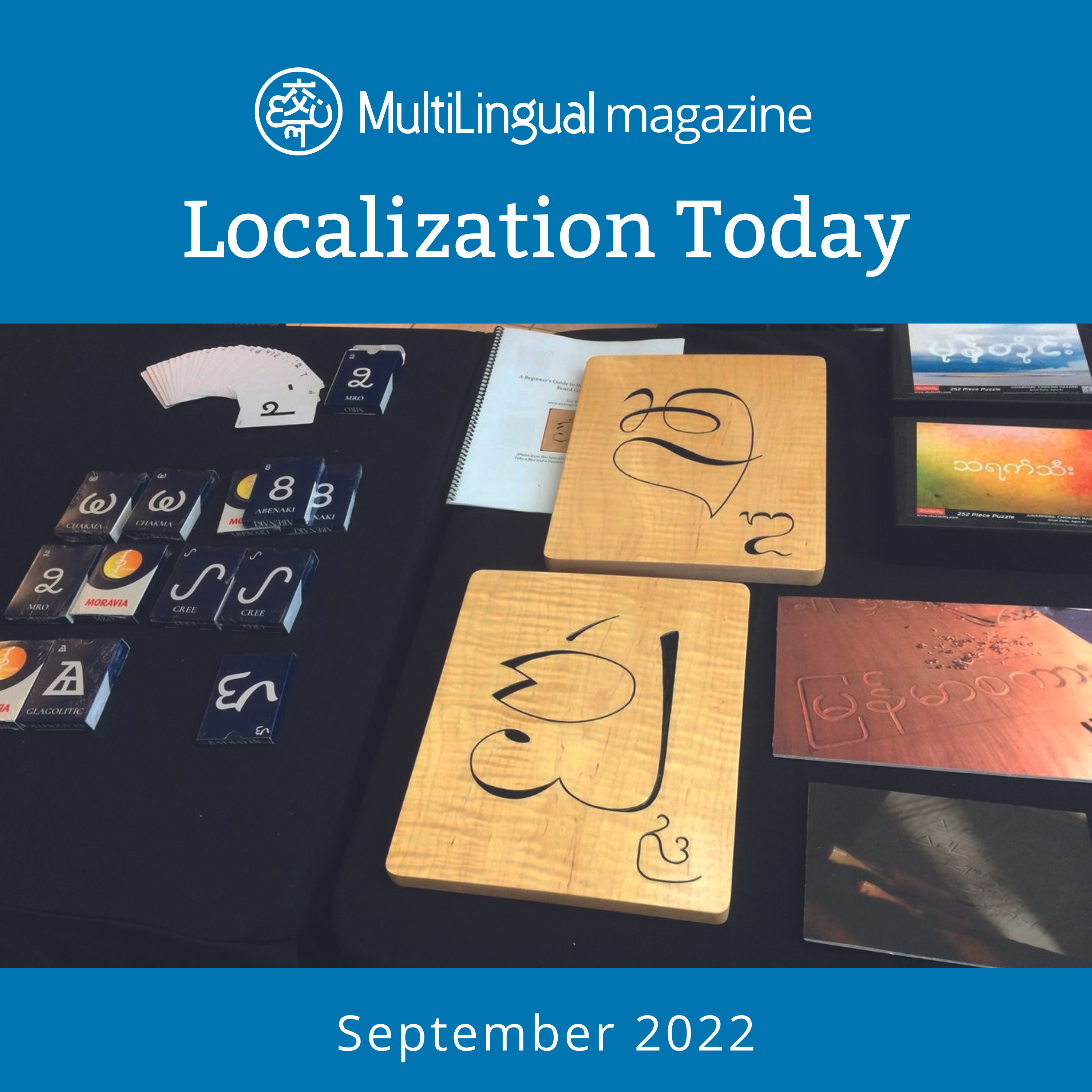Episode Transcript
[00:00:00] From vendors to guardians A new role for LSPs in the fight for Language Rights by Carol Velandia Almost two years ago, this magazine published my article A New Role for LSPS in the Field of Social justice, which challenged language service providers to embrace a moral imperative to become active agents of inclusion, not just providers of services.
[00:00:27] That article was personal.
[00:00:29] I wrote it not just as a professional in the language services industry, but as someone who has repeatedly witnessed the deep injustice that results when people are denied their right to be understood.
[00:00:40] Now what was a warning has become a Crisis.
[00:00:44] Executive Order E.O. 14,224, signed by United States U.S. president Donald Trump on March 1, 2025, declared English as the official language of U.S. federal agencies.
[00:00:58] E.O. 14,224 also revoked a previous E.O. 13,166 sign in the year 2000 that promoted services for people with limited English proficiency, LEP. In doing so, it stripped away protections that millions of people relied on to access healthcare, justice, education, and basic benefits.
[00:01:20] While EO14224 is not a law or regulation and it cannot be enforced in any court, on July 14, the Trump administration issued official guidance encouraging federal agencies to minimize non essential multilingual services.
[00:01:36] The message is EO14224 is meant to erase our multilingual identity and is a direct assault on long standing civil rights.
[00:01:47] Such an action demands a response not just from policymakers, but from all of us.
[00:01:53] Drawing from the parable of the frog in gradually heated water, we must recognize and respond to incremental threats before they culminate in irreversible consequences.
[00:02:03] This is not about fear mongering, but about demonstrating the courage to confront injustice and uphold our professional integrity.
[00:02:11] We knew this was coming. Sort of. My 2023 article warned that language discrimination was being normalized in several ways.
[00:02:20] Minor children were interpreting legal contracts. Bilingualism was being romanticized while access to government services was being restricted or denied. LE people were largely unaware of their rights and didn't have an organized identity around which to rally. There was no multilingual movement, and now, with io14224 in place, the consequences are clear. Without stronger legal protections at the federal, state, and local level, LEP individuals will fall through the cracks of every critical institution in American life.
[00:02:56] Overcoming Imposter Syndrome in Advocacy I didn't begin my journey as an advocate. I started out, like many of you, as an interpreter focused on the mechanics of communication, craft of language, and precision of meaning.
[00:03:10] I believed in the power of words, but For a long time, I didn't see myself as someone who could shape policy or change minds at scale.
[00:03:18] That changed the first time I attended Language Advocacy day in Washington, D.C. organized by the Joint National Committee for Languages, National Council for Languages and International Studies.
[00:03:31] I arrived eager, passionate, and prepared to advocate for the people I served every day, those who navigate our systems without English fluency and who are so often overlooked in diversity, equity and inclusion DEI initiatives.
[00:03:47] But instead of a voice for them, what I heard was silence.
[00:03:51] The advocates around me were brilliant, but only focused on protecting foreign language education and global learning programs.
[00:03:58] No one was Talking about the 26 million LEP individuals in our country whose lives and liberties are in jeopardy when interpreters are not present in hospitals, courtrooms or schools.
[00:04:09] These 26 million voices were absent from the conversations in Washington, D.C. as they often are in DEI initiatives where language is routinely treated as a footnote to intersectionality rather than a central axis of access.
[00:04:24] And now, of course, DEI has become taboo. Multilingualism branded un American, and inclusion dismissed as a radical idea.
[00:04:34] No one in that room was asking for federal investment in language access.
[00:04:38] I remember being surrounded by powerful voices who understood the value of learning languages, but not the leap between being bilingual and being a professional interpreter. They didn't see how critical our profession is to making equity and inclusion real.
[00:04:54] I felt invisible. But I wasn't discouraged.
[00:04:57] My voice as an advocate was not extinguished.
[00:05:00] Instead, it was ignited.
[00:05:03] Finding my voice and a community upon joining the association of Language Companies ALC and participating in its Advocacy Day since its inception in 2020, I've observed an evolution.
[00:05:17] In recent years, under the incredible leadership of advocates like our colleague Bill Rivers, we've more openly addressed language access, aligning discussions with the core of our profession.
[00:05:29] In that virtual room advocating for the language industry and language access for the first time, I didn't feel like a lone voice.
[00:05:37] I felt like I was part of a movement.
[00:05:40] In March 2024 and in our most recent on the Hill Advocacy Day, ALC advocacy efforts achieved the $4 million in federal funds to inform LEP individuals about their rights.
[00:05:53] Revisions to federal civil rights regulations, implementing Section 1557 of the Affordable Care act.
[00:06:01] An elevated image of our industry as essential to equity, not just economics.
[00:06:07] Next, we must consider advocating for comprehensive federal language access legislation like the Americans Its Disabilities act ada, a law that enshrines language access as a fundamental right.
[00:06:19] It might seem counterintuitive to do this in the current political landscape, when anything that seems to promote DEI has been demonized and anything that highlights the immigrants and slaves who formed the country's foundation seems paradoxically un American.
[00:06:35] Like the colonists facing a tyrannical ruler who was restricting people's unalienable rights, this is the moment to advocate for people's language rights, illegal and moral imperative.
[00:06:48] In April, this magazine published an interview with Michael muhle from the U.S. department of Justice.
[00:06:54] He reminded us that Title 6 of the Civil Rights act of 1964 requires all federally funded programs to provide meaningful access to people with love. These aren't suggestions, they're legal mandates grounded in our national values.
[00:07:10] Mule's warning is especially urgent now.
[00:07:13] EO14224 does not reference Title 6 or similar laws because it cannot undo the protections those civil rights laws created for every person in the US no matter what language they speak. EO14224 doesn't just revoke EO13166. It symbolically declares that English is the only language that matters. It signals to millions of people, if you can't speak English, you don't belong here. That message is un American and it is unacceptable.
[00:07:46] A Global Crisis and responsibility While io14224 targets US protections, language injustice is not confined to any one nation.
[00:07:58] Worldwide, linguistic minorities face systemic exclusion in humanitarian crises and national disasters where interpreters are absent, in education systems where bilingual students are penalized or isolated, and in legal systems where verdicts are rendered without participants comprehension.
[00:08:18] As the global language industry surpasses $75 billion, it is unconscionable that we remain on the sidelines of this global equity crisis.
[00:08:28] We are the only profession whose entire purpose is to break language barriers, and yet we recognize that the largest barriers are not those of language, but rather narrow mindedness and exclusionary policies.
[00:08:41] We need to continue to challenge policies that undermine effective communication, access and inclusion.
[00:08:49] What US peas must do now 1.
[00:08:52] Publicly oppose EO14224 I've heard from so many in our field I don't want to get political, but language access is not politics. It's people, culture and identity, its ethics and its survival.
[00:09:09] Now is the time to publicly oppose E.O. 14,224 and all efforts to roll back language rights.
[00:09:17] Let's show the world that we are not just vendors, we are defenders.
[00:09:21] LSPs, particularly those operating in the US should issue formal statements opposing the repeal of EO13166 and the establishment of English only policies.
[00:09:35] Silence may be interpreted as acquiescence.
[00:09:38] Therefore, it is imperative to articulate a clear stance.
[00:09:42] Public opposition underscores the industry's commitment to linguistic diversity and the rights of people with LEP.
[00:09:49] 2.
[00:09:50] Educate clients and Communities Many stakeholders, including public service professionals such as doctors, nurses, educators, and social workers, may be unaware of the protections that have been rescinded. LSPs must proactively fill this information void by providing clear guidance and practical solutions grounded in ethics and equity.
[00:10:12] This responsibility extends to independent interpreters who should inform LEP clients of their long standing right to effective communication in public services.
[00:10:22] By becoming authoritative sources on language access, we empower our clients and communities to navigate these changes effectively.
[00:10:30] It's crucial to recognize that many public service professionals already have ethical obligations to communicate effectively with the communities they serve.
[00:10:40] Nurses the American Nurses Association's Code of Ethics emphasizes that nurses must practice with compassion and respect for the inherent dignity, worth, and unique attributes of every person, which includes effective communication.
[00:10:56] The American Pharmacists Association's Code of Ethics states that pharmacists must communicate with patients in terms that are understandable, respecting personal and cultural differences.
[00:11:07] Social Workers the National association of Social Workers Standards highlight the ethical obligation to address health disparities by educating colleagues, the media, allied professionals, decision makers, and other stakeholders on the impact of health disparities and unequal access to health services.
[00:11:26] Doctors the American Medical Association's Code of Medical Ethics underscores the importance of effective communication between physicians and their patients.
[00:11:36] It emphasizes that patients have the right to receive comprehensive information and to ask questions about recommended treatments, enabling them to make well considered decisions regarding their care.
[00:11:47] This ethical obligation ensures that patients are fully informed participants in their healthcare decisions.
[00:11:55] Attorneys the American Bar Association's Model Rules of Professional Conduct, specifically the Rule on Communications, mandate that attorneys must promptly inform clients of decisions requiring their informed consent, consult about the means to achieve client objectives, keep clients reasonably informed about case status, and comply with reasonable requests for information.
[00:12:18] These obligations ensure that clients can actively and effectively participate in their legal representation.
[00:12:26] 3.
[00:12:27] Advocate for language Access Policies While federal agency policies may be shifting, state and local governments must follow Title VI and related laws, and they can enact measures to protect language access.
[00:12:41] LSPs should collaborate with advocacy groups to promote legislation that upholds and expands language services at state and regional levels.
[00:12:50] Engaging with policymakers, participating in public forums, and supporting grassroots initiatives can influence positive change.
[00:12:59] 4.
[00:13:00] Advocate for global language access standards the enactment of EO14224 serves as a wake up call for the global language industry.
[00:13:11] LSPs must collaborate with international organizations, human rights bodies, and governments to establish and enforce comprehensive language access standards by elevating this issue to the global stage, we can work towards policies that transcend national boundaries and uphold the rights of linguistic minorities worldwide.
[00:13:31] Article 2 of the 1948 Universal Declaration of Human Rights explains how everyone is entitled to all the rights and freedoms in the Declaration without distinction of any kind such as race, color, sex or language.
[00:13:48] Now, almost 80 years later, isn't it time for a Language Access international standard?
[00:13:55] Conclusion LSPs must transition from being perceived solely as service providers to being recognized as pivotal defenders of human rights.
[00:14:04] This shift involves actively challenging policies and that undermine effective communication, access and inclusion.
[00:14:12] By embracing this expanded role, we affirm our commitment to breaking down barriers, not just linguistic ones, but also those rooted in discrimination, prejudice and exclusion.
[00:14:24] We are not passive facilitators of communication. We are the frontline of human rights.
[00:14:30] Let us act like it When I first founded my company, Equal Access Language Services, I wasn't sure how to talk about justice and profit in the same breath. But I've learned they are not opposites. Helping clients see the return on investment ROI of language access through reduced liability, better customer experience, and broader market reach is one of the most strategic moves any business can make. And if that's what gets them to invest, great.
[00:14:59] Let them come for the compliance and stay for the compassion.
[00:15:02] My original 2023 article concluded with an do good. Don't just do business.
[00:15:09] In 2025, that invitation becomes a directive. We must no longer see ourselves as vendors of services.
[00:15:17] We must be guardians of comprehension, defenders of dignity, and champions of inclusion.
[00:15:23] Because if we don't fight for the right to understand and be Understood, who will?
[00:15:28] Io14224 must not be the end of the story.
[00:15:33] It must be the beginning of better and stronger laws.
[00:15:37] Let this be our turning point.
[00:15:39] Let this be the moment that language access became a movement.
[00:15:44] This article was written by Carol Valandia. She is founder and CEO of Equal Access Language Services as well as a nationally recognized advocate for language access.
[00:15:55] She developed the award winning program Effective Inclusion through Language Access Trademark to enhance language service delivery across various sectors.
[00:16:05] Originally published in Multilingual Magazine issue 242July 2020.


